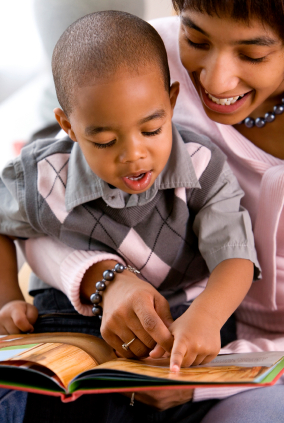 We all know that reading to our children is an important part of their intellectual and emotional development. But why is this so? Susan B. Neuman, professor of childhood studies at the University of Michigan, gives some insight.
We all know that reading to our children is an important part of their intellectual and emotional development. But why is this so? Susan B. Neuman, professor of childhood studies at the University of Michigan, gives some insight.
Dr. Neuman points out that reading is fun, stimulates the imagination, provides knowledge of the world and life, including problems and the solving of problems. Language development is also strengthened by hearing words being read aloud. Children who are read a variety of books on a daily basis also develop a sense of community, an understanding of “what it means to be human,” and to learn empathy as they are introduced to cultures and people that are different than their own.
Most parents are already convinced of the importance of reading, but with so many children’s books on the market, it can be hard to know which books are best. Here are some simple tips for choosing – and reading! – books according to your child’s age.
birth – 1 year
Look for small, brightly colored books with photos of babies and familiar objects like balls and bottles. Draw attention to the objects by saying things like, “Look at the ball,” or point to pictures and ask, “What’s that?”
1 – 2 years
Look for sturdier books that can be handled and carried; few words on teh pages or simple rhyming themes. Talk about the pictures — you don’t necessarily have to read the book to tell the story.
2 – 3 years
Look for silly or funny books with subjects like food, animals, or making friends. SImple word books are good choices. Keep stories short and read them with few interruptions. Then, re-read them.
3 – 4 years
Look for books that tell simple stories with a beginning, a middle, and end; stories that relate to life, like overcoming fear; information books about children’s interests. As you read ask your child questions about the story: “What do you think will happen next? Why?” Keep them engaged.
5 – 6 years
Look for stories and information books that evoke children’s lively imagination and interests; books about space, machines, time, and other cultures. Ask your child to tell you what interests her most about the story. Use open-ended questions to encourage her to relate her ideas. Allow her to ask questions as you read.
Compiled by Theresa Case, whose Kindermusik program at Piano Central Studios in Greenville, SC, is proudly among the top 1% of Kindermusik programs worldwide.

Minds On Music – The Kindermusik Blog
For three generations, Kindermusik has helped millions of children around the world build a strong foundation for a lifetime of learning.
